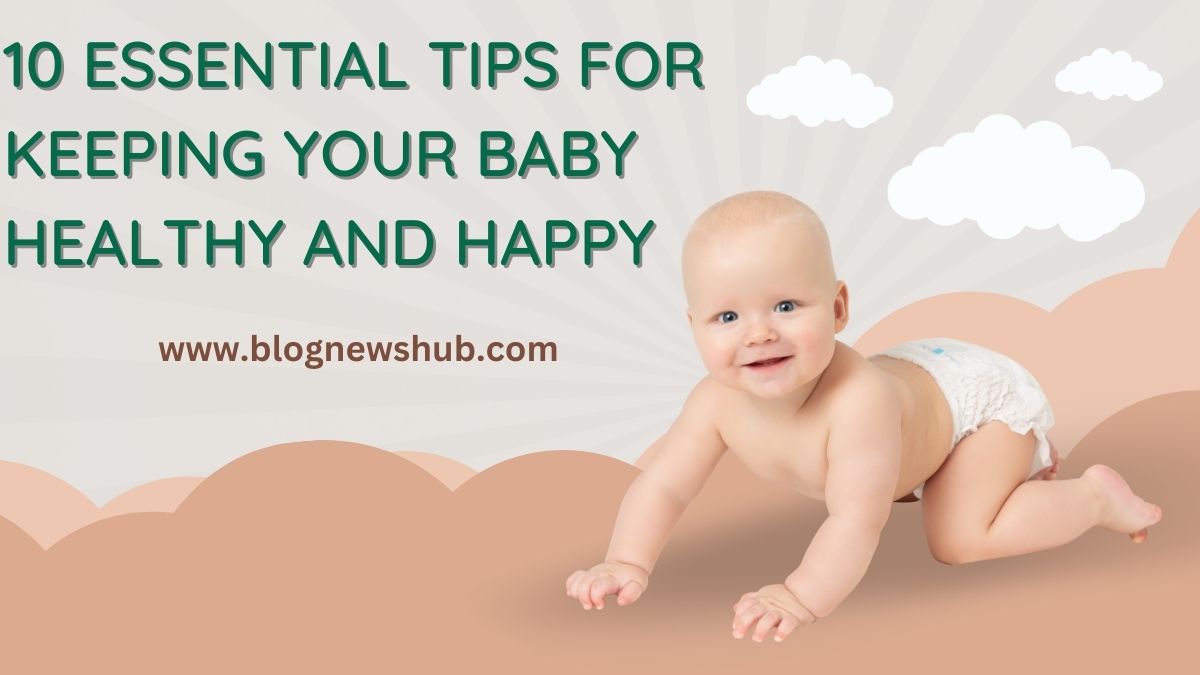The health of your baby is a top priority for any parent, and there are many steps you can take to keep your baby healthy and thriving. From ensuring proper nutrition to practicing good hygiene and creating a safe sleep environment, many essential tips can help you care for your baby’s health. When it comes to creating a healthy sleeping environment, the choice of a mattress can significantly impact your baby’s health. Investing in a mini crib mattress is a great way to create a safe and comfortable sleeping space for your baby.
It’s also important to stay informed about the latest recommendations for baby care, so you can make informed decisions and provide the best possible care for your little one. Whether you’re a new parent or an experienced one, there’s always something new to learn about caring for your baby’s health. In this article, we’ll explore ten essential tips that can help you keep your baby healthy and thriving, from ensuring proper nutrition to fostering emotional well-being and more. So, let’s dive in and discover how you can give your baby the best possible start in life.
10 Essential Tips for Keeping Your Baby Healthy and Happy
Ensure Proper Nutrition
In the first six months of life, breast milk is the best source of nutrition for most babies. It provides all the nutrients your baby needs and helps protect against infections and illnesses. If breastfeeding isn’t an option, choose an infant formula that meets your baby’s needs. As your baby grows, introduce solid foods based on your pediatrician’s recommendations. Aim to provide a variety of foods, including fruits, vegetables, whole grains, and proteins.
Get Vaccinations on Time
Vaccines protect your baby from serious illnesses like measles, whooping cough, and meningitis. The CDC recommends a specific schedule of vaccines for babies, so make sure you follow it. If you have concerns about vaccines, talk to your pediatrician.
Keep up With Well-Baby Checkups
Regular visits to the pediatrician are important for monitoring your baby’s growth and development, as well as catching any potential health problems early on. During these appointments, your pediatrician will check your baby’s weight, length, head circumference, and developmental milestones.
Practice Good Hygiene
Good hygiene is crucial for keeping your baby healthy. Wash your hands frequently, especially before handling your baby, and make sure anyone who interacts with your baby does the same. Clean your baby’s toys, pacifiers, and other items frequently. Also, keep your baby’s environment clean and free of germs.
Create a Safe Sleep Environment
Sleep is crucial for your baby’s growth and development, but it’s important to make sure they’re sleeping in a safe environment. The AAP recommends putting your baby to sleep on their back, using a firm and flat sleep surface, and avoiding any soft objects or loose bedding in the crib. Make sure your baby’s room is at a comfortable temperature and use a sleep sack instead of blankets to keep them warm.
Practice Safe Car Seats Use
Car seat safety is an essential part of ensuring your baby’s health and well-being while traveling. A properly installed car seat can protect your baby from injury and even save their life in the event of an accident. When selecting a car seat for your baby, it’s crucial to choose one that is appropriate for their age, weight, and height. The American Academy of Pediatrics (AAP) recommends that infants and toddlers ride in a rear-facing car seat until they are at least two years old or until they exceed the height or weight limit of the car seat.
Protect Against Sun Exposure
Babies under six months of age should be kept out of direct sunlight. If you must be outside, use a hat, protective clothing, and sunscreen with an SPF of at least 30. Keep in mind that babies can get dehydrated quickly, so offer plenty of fluids.
Foster Emotional Well-being
Your baby’s emotional well-being is just as important as its physical health. Respond promptly to your baby’s cries, hold and cuddle them often, and provide a safe and nurturing environment. Play with your baby and read to them to promote healthy brain development.
Practice Safe Feeding
Feeding your baby is a critical aspect of their health and development. Whether you’re breastfeeding or using a formula, it’s essential to follow safe feeding practices to ensure that your baby gets the nutrition they need and stays healthy. Also ensure the temperature of the food or bottle is appropriate, and always supervise them. Don’t put your baby to bed with a bottle, as this can lead to tooth decay.
Stay Informed
Staying informed about the latest recommendations for baby care is an important part of being a responsible and informed parent. Advances in medical research and technology are constantly changing the landscape of infant care, and it’s crucial to keep up to date to ensure that you’re providing your baby with the best possible care.
Frequently Ask Questions (FAQs)
Question: When can I start introducing solid foods to my baby’s diet?
Answer: According to the AAP, most babies are ready for solid foods between 4 and 6 months of age. Look for signs that your baby is ready to try solids, such as being able to sit up and hold their head steady, showing an interest in food, and being able to swallow food. Start with single-ingredient purees and gradually introduce new foods, one at a time, to watch for any signs of food allergies or intolerances.
Question: When should I start taking my baby to the doctor for regular check-ups?
Answer: The American Academy of Pediatrics (AAP) recommends that babies have their first doctor’s visit within three to five days after birth, followed by regular check-ups at the following intervals: 1 month, 2 months, 4 months, 6 months, 9 months, 12 months, 15 months, 18 months, 24 months, 30 months, and 3 years. After age 3, your child should have an annual check-up. These check-ups are important for monitoring your baby’s growth and development, and for catching any potential health problems early on.
Conclusion
In conclusion, taking care of a baby’s health is a crucial responsibility for any parent. By following these 10 essential tips, including practicing safe sleep, feeding, and car seat use, staying informed about the latest recommendations, and seeking help when needed, you can ensure that your baby is healthy and happy. Additionally, by keeping up with frequently asked questions about your baby’s health, you can be better prepared to address common concerns and make informed decisions about your baby’s care. Remember, as a parent, you play a vital role in your baby’s well-being, and with the right knowledge and support, you can provide them with the best possible start in life.




